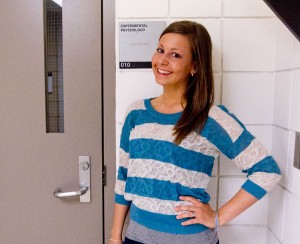Senior Kristen Axelsen is an A student who is planning to spend the five years after her graduation working hard to earn a doctoral degree in psychology. But for three semesters at Ithaca College, it was all about laughter.

In the spring of her sophomore year, Axelsen, a psychology major with a minor in counseling, was selected to join the Advancing Autism Treatment Team, a student research team that analyzed the laughter of children with autism compared to normally developing kids and worked to evaluate the way laughter can help children with autism become more socialized and have happier home lives.
As a researcher, Axelsen worked with other students to create focus groups that combined both children with autism and normally developing children and their mothers, and tested whether mothers could differentiate between the laugh sounds of the children. The team also asked mothers to rank the laughs in terms of appeal.
Axelsen said the team expected mothers of children with autism would find their children’s laughs less appealing because of the stress of raising a child with special needs. However, the team found mothers appreciate the laugh sounds of all children equally. This means physiologists can use laughter to help bring families struggling with autism together, as well as to help socialize children, she said.
“Usually kids with autism have socialization deficits and they don’t really connect that well with their families,” Axelsen said. “We thought if using this laughter elicited positive reactions in their parents, we could use this to improve everyone with the treatment.”
That work inspired her to pursue a career in school psychology helping to develop programs that will allow special-needs students to get the most out of their education.
Now, Axelsen is an intern for the Beverly J. Martin Elementary School in Ithaca that serves the underprivileged population, also known as a Title 1 school. She works with the school psychologist to help plan and execute behavior interventions with students that have impulse control problems and collects data to classify students with special needs and get them the services they need.
“A lot of students, especially those who are younger, don’t ask to be poor, they don’t ask to come from divorced families or seeing abusive relationships within their families, and you can see how they develop over time because of situations they can’t control,” she said.
Watching the students improve in school drives Axelsen to continue her work.
“I’ve gotten thank-you cards, smiles and thank-yous — just those little things that make a difference makes it worth it,” she said.
At the internship, she works
under Farr Carey, a school psychologist. Most interns Carey had worked with before had already completed school psychology graduate programs before coming to the school. Axelsen is
Carey’s first undergraduate intern.
“She’s got a great sense of humor and is happy to be with them — they just adore her,” she said. “Anything she sets her mind to she’s going to be extremely successful at.”
While she’s passionate about her work, Axelsen said she was interested in Ithaca College partly because there are opportunities to dance. She is a dancer for Pulse and IC Unbound, two dance organizations on campus. Axelsen began dancing when she was three years old and now dances almost every day.
“That’s where I find my balance,” she said. “I just can’t see myself not dancing.”
Senior Sydney Normil, a member of IC Hip Hop, dances with Axelsen and said she is passionate about two things: people and dance.
“[Dance is] one of the most important things to her; she’s very dedicated to it and she always goes full-out,” Normil said. “She pays attention, and she puts her all into it. Her body conveys how much she loves it.”
Axelsen said working toward her goal of becoming a school psychologist as well as having her own private practice will be difficult, but worth the effort.
“It’s going to be a long road, but I’m excited because it’s what I want to do,” she said.







